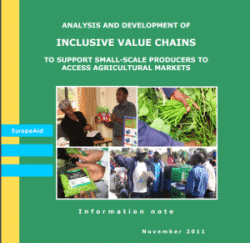
Policy highlights:
- Value chain (VC) analysis and development can improve the living conditions of rural populations while contributing to food security. Evidence has shown that agricultural growth in developing countries contributes to poverty alleviation, but this requires the participation of small-scale farmers.
- Agricultural VCs are made up of producers, processors, dealers, distributors, wholesalers, retailers, and consumers, with value being added to the product at each step in the chain. However, given the many hurdles they have to overcome, small-scale farmers often have trouble accessing markets.
- Common constraints identified by agricultural VC analysis are: 1) the scattering of farms and increasing input and transportation costs; 2) market failures, for instance, when producers are unaware of pricing; 3) asymmetry, for example, when distributors fix prices; 4) distorted competition, such as through cartels or subsidization; 5) access difficulties in relation to transport and energy infrastructure.
- VC analysis and development facilitates market participation of small-scale farmers by making them aware of their economic environment, especially when applied through producer organizations which can guarantee product quality, while providing training and support.









